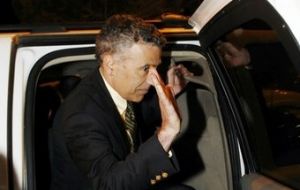MercoPress. South Atlantic News Agency
Protests in Bolivia cuts gas exports; US ambassador expelled
 Ambassador Philip Goldberg
Ambassador Philip Goldberg President Evo Morales said Wednesday that he is expelling the U.S. ambassador in Bolivia for allegedly inciting violent opposition protests. Morales' announcement came hours after a pipeline blast triggered by saboteurs forced the country to cut natural gas exports to Brazil by 10%.
"Without fear of the empire, I declare the U.S. ambassador 'persona non grata" Morales said in a speech at the presidential palace. He added he instructed his foreign minister to send a diplomatic note to Ambassador Philip Goldberg whom he accused of constipation with "separatists and divisionists". In Washington, US State Department spokesman Gordon Duguid called the accusation "baseless" and said the US government had not yet received a note about the ambassador. The Bolivian president is facing for the second week a wave of increasingly violent anti-Morales protests, the harvest of an "alliance between Bolivia's extreme right and the US government". Ambassador Goldberg met last week with Ruben Costas, one of Morales' most virulent opponents. Costas is governor of Santa Cruz, Bolivia's richest province and the seat of a pro-autonomy revolt against the nation's first indigenous president. Anti-Morales protests reached a crescendo on Tuesday with the sacking and burning of government offices in Santa Cruz in which at least 10 people were reported injured. Anti-government activists also seized several natural gas installations in the east. In the eastern province of Tarija demonstrators triggered Wednesday's pipeline blast by closing a valve, creating pressure that ruptured the line near the border with Paraguay and set off a fire, the government said. No injuries were reported in what state energy company president Santos Ramirez called "a terrorist attack". Ramirez said both gas plants remained occupied by protesters on Wednesday afternoon and indicated Army troops had been sent to recover the plants and impose order. He estimated damages and losses in 100 million US dollars, plus three weeks to repair the pipeline. The pipeline blast reduced by 3 million the 30 million cubic meters of gas Bolivia sends Brazil each day, he said. But in Brazil, Mining and Energy Ministry officials said the gas flow remained normal. Any supply interruption could have serious consequences since Bolivia supplies Brazil with 50% of its natural gas used for power generation and cooking. Morales' opponents in the east are seeking a greater share of revenues from natural gas â€" Bolivia's chief export â€" for the richer lowland provinces, home to the bulk of its gas fields. But Morales has devoted much of those revenues to programs that benefit the poor and elderly. He has called the protests a "civil coup". Morales is seeking approval in Congress for a referendum next December for constitutional changes which are fiercely opposed by opposition governors who rule five of Bolivia's nine provinces. They want greater autonomy and more control over natural gas revenues in their areas. The president wants to give more power to the country's indigenous and poor communities, by carrying out land reform and redistributing gas revenues.




Top Comments
Disclaimer & comment rulesCommenting for this story is now closed.
If you have a Facebook account, become a fan and comment on our Facebook Page!